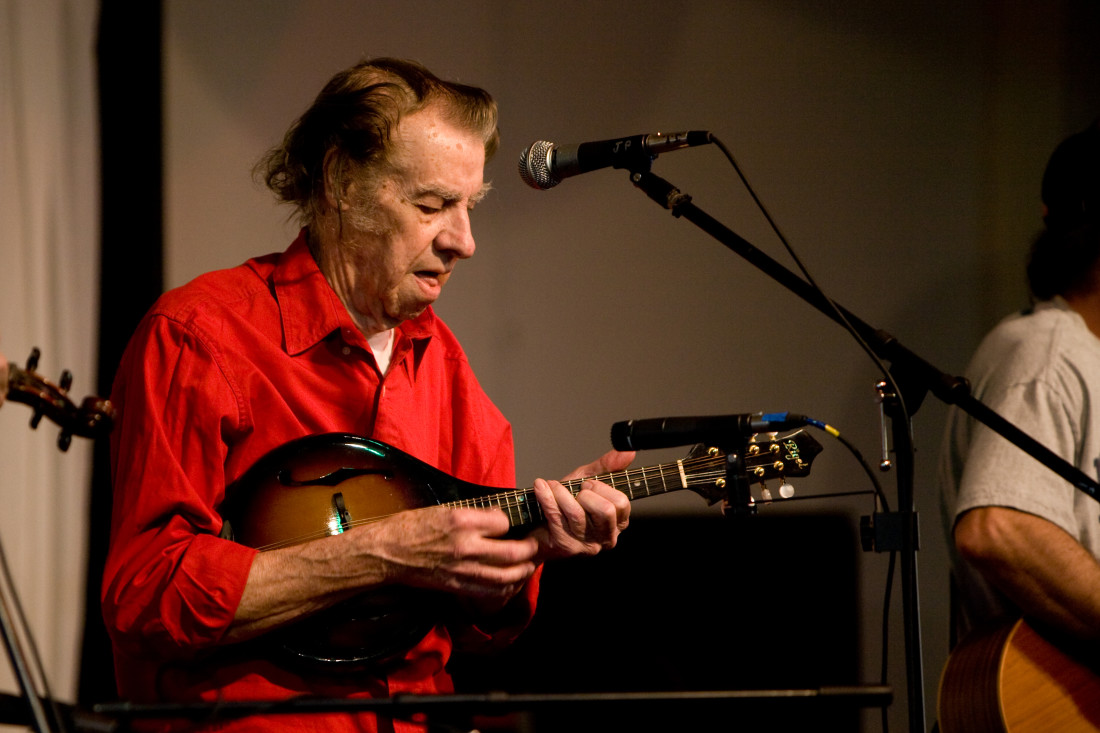Though there’s long been a musical outfit using the name, arguably anyone who’s followed in the musical footsteps of Ralph Lewis might wish to consider himself or herself an honorary member of the legion known as Sons of Ralph. The bluegrass pioneer and Western North Carolina legend died last Saturday at age 89.
A native of Big Laurel in Madison County, Lewis was a prime mover in bluegrass. He came from a family steeped in the musical tradition and began performing — initially in the folk and gospel idioms with older brother Ervin Lewis — in the early 1940s when he was just 15.
Playing as a duo, Ralph and Ervin billed themselves as the Carolina Pals and they hosted a daily radio show on Asheville’s WLOS-AM. Later, Ervin moved to Niagara Falls, N.Y. and started a band with another brother, Blanco Lewis. After Blanco died in World War II, Ralph moved north as well, taking took Blanco’s place in that band.
By the late 1940s, Ralph had relocated to Detroit and moved beyond bluegrass. “I was playing rock ‘n’ roll and didn’t know it,” he said in a 1998 Xpress interview. He was on record as a Beatles fan in the early 1960s. And, though Ralph was still immersed in traditional music, he wasn’t afraid to push beyond the confines of the genre to create new styles.
His group, the Piney Mountain Boys, would record a cover of Creedence Clearwater Revival’s “Proud Mary” in 1969. Along with tracks cut around the same time by Bill Monroe’s Blue Grass Boys, that song is considered one of the first progressive bluegrass tunes. In the space of less than two minutes, the Piney Mountain Boys’ recording bridged the gap between rock and traditional bluegrass, paving the way for modern interpreters of the form to pursue their own musical directions.
Monroe took notice of Ralph’s work, eventually inviting him to tour worldwide with the Blue Grass Boys. In 1977, Ralph and sons Don and Martin Lewis performed as part of a mountain music tribute at the Smithsonian Institution in Washington, D.C. Along with that and other musical endeavors, Ralph found time to start and run the family business, Lewis Refrigeration Co., while raising his family.
Still musically active in the new century, Ralph was recognized in 2001 with the prestigious Bascom Lamar Lunsford Award, an annual spotlighting of individuals who have made major contributions to Appalachian folk music traditions. And, along the way, he played Nashville’s Grand Ole Opry countless times.
In 2001, the Lewis family patriarch formed Sons of Ralph with Martin and Don. An Asheville institution, the band released several albums, including the 2003 live collection Tune to This and the 2011 EP Livin’ in Asheville. Both of those sets showcased Ralph’s innate ability to transcend genre while keeping that which makes traditional bluegrass special.
Well beyond influencing the musical paths of his sons, Ralph mentored untold numbers of Appalachian musicians. A multi-instrumentalist — he sang and played mandolin, electric and acoustic guitars, baritone guitar and fiddle — Ralph never forsook his mountain music roots; he simply bent the form to his own purposes.
Ralph Lewis will be interred Saturday, Aug. 12. Madison Funeral Services in Marshall will host a public visitation from 4 to 9 p.m.



Before you comment
The comments section is here to provide a platform for civil dialogue on the issues we face together as a local community. Xpress is committed to offering this platform for all voices, but when the tone of the discussion gets nasty or strays off topic, we believe many people choose not to participate. Xpress editors are determined to moderate comments to ensure a constructive interchange is maintained. All comments judged not to be in keeping with the spirit of civil discourse will be removed and repeat violators will be banned. See here for our terms of service. Thank you for being part of this effort to promote respectful discussion.